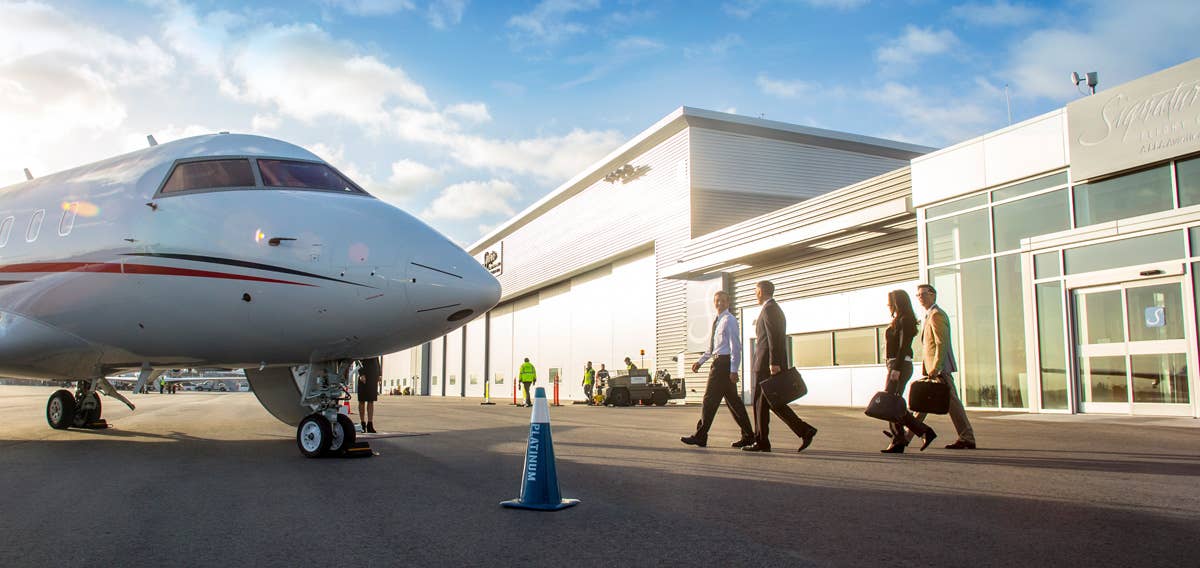FBO Market Sees Strong Interest From Private Equity Funds
Private equity investors have been earnestly searching for yield, and a major investment target garnering interest has been fixed based operators (FBOs).

Signature Aviation was purchased by a consortium of private equity firms in May. Courtesy: Signature Aviation
Private equity investors have been earnestly searching for yield, and a major investment target garnering interest has been fixed based operators (FBOs).
In May after a bidding war, a consortium of private equity firms—including Blackstone, Global Infrastructure Partners, and Cascade Investments—worked together to purchase Signature Aviation for $4.7 billion from Global Infrastructure Partners. Signature operates the world’s largest FBO network with more than 200 locations globally.
Modern Aviation, on its own shopping spree and backed by Tiger Infrastructure, acquired five New York FBOs from Sheltair in October and Puerto Rican-based Hill Aviation within a week.
In September, KKR closed its $4.47 billion acquisition of FBO chain Atlantic Aviation in September and later followed up that purchase with a consolidation play when it announced a merger between Atlantic and Ross Aviation. Ross Aviation operates 19 FBOs across the United States and the Caribbean, joining almost 70 Atlantic FBOs.
These deals have caused analysts to dub 2021 as the year of the FBO in M&A, with a strong belief that another significant FBO could be acquired soon.
Left in Question: General Dynamic’s Jet Aviation
The largest chain player left out there is the General Dynamic subsidiary Jet Aviation— with more than 30 locations—which it purchased in 2008 to provide strategic global maintenance support for its other company, the Gulfstream Aerospace Company.
In an interview with the Washington Post at the time, former General Dynamic chairman and chief executive Nicholas D. Chabraja said, “Our principal interest in this was getting more into the maintenance, repair and overhaul business,” and based on General Dynamic’s strong balance sheet today, a sale of Jet Aviation would be hard to rationalize.
Otherwise, the rest of the FBO market remains fragmented, and there might be more consolidation to grow networks, before larger sales, or funds would need to do the consolidation themselves, buying smaller, independent FBOs to establish a scalable platform.
What Investors Want
FBOs are attractive to buyers for many reasons including:
- fueling
- location
- a mix of services
- competition
- leases
To establish realistic expectations and position an asset to maximize its value, sellers would need to show off the value of each to buyers. Meanwhile, private equity and other infrastructure funds are acquiring FBO assets and opportunities to boost EBITDA through scale to reduce selling, general, and administrative (SG&A) expenses.
A Decade-Long Trend
The interest in FBOs goes as far back as 2005. A boom occurred in 2008 after the financial markets crashed as private equity firms looked for distressed assets to include in their portfolio, in addition to improving synergies across other lines of business. This is the case with the Carlyle Group, whose aerospace holding exceeded $8 billion in 2008 and included a group of companies that would later become Landmark Aviation, before it was later sold to the BBA Aviation, the parent company that owned Signature before its recent sale.
Now, the pandemic has increased demand for business jets from customers looking for safer and more reliable means of air travel in the current environment, as evidenced by the recent report from GAMA aviation. The report says turboprop deliveries grew by 40.6 percent and jet deliveries grew by 15.9 percent when compared to the same period in 2020.
What is clear is that interest in FBOs usually surges when airline travel slumps, as during the pandemic. But considering that the two major players—Signature and Atlantic—have come off the board, despite the strong belief that another major FBO might also come up for sale, all evidence points to more consolidation first.

Subscribe to Our Newsletter
Get the latest FLYING stories delivered directly to your inbox






